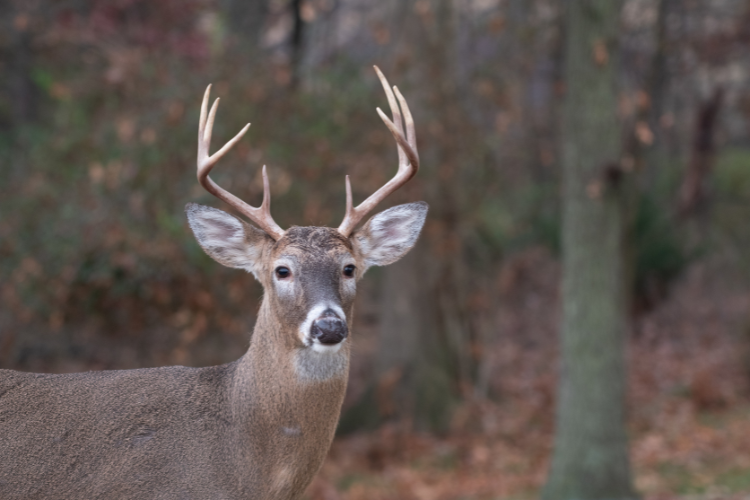Before hitting the woods this fall, make sure you purchase your license and brush up on Tennessee’s hunting regulations.

Hunting deer in Tennessee is a popular outdoor activity that requires proper licensing and adherence to state regulations. Understanding the specific licenses and permits needed is essential for a legal and successful hunting experience. Whether you are a resident or a nonresident, knowing the requirements for a Tennessee Deer license will help you prepare adequately before heading into the field. This guide provides detailed information on the licenses, permits, season dates, bag limits, and other important considerations for hunting deer in Tennessee.
To hunt Deer in Tennessee, you’ll need a valid hunting license issued by the Tennessee Wildlife Resources Agency (TWRA). Both residents and nonresidents are required to have a hunting license to legally pursue deer within the state.
Hunters who buy the Combination Hunt/Fish Annual license must also purchase the required supplemental big-game license(s) (gun, archery, muzzleloader) to hunt deer. Sportsman and Lifetime Sportsman license holders are exempt from supplemental licenses. WMA permits are additionally required to hunt big game on many WMAs.
Hunter Education is mandatory for anyone born on or after January 1, 1969 (with an Apprentice Hunter Education Permit available for a limited time under required supervision).
These steps ensure compliance with Tennessee’s hunting regulations and promote responsible hunting practices.
Besides the general hunting license and deer permit, Tennessee requires hunters to be aware of any additional permits or stamps that may apply. For deer hunting, there are no migratory bird stamps or other species-specific stamps required.
Deer hunting in Tennessee does not typically require entry into a lottery or draw system for general seasons; however, certain WMA deer hunts are quota hunts and require a separate application during TWRA’s quota period.
TWRA lists deer season dates in their official regulations. Season dates can change each year, so always be sure to reference the most recent regulations.
Generally, TN offers an August Archery (Velvet) Hunt, which is toward the end of Aug. (check regs for exact dates), and the regular archery season opens in late September, with subsequent muzzleloader and gun segments—see the current Hunt Season Planner and Deer page for exact dates and any unit/WMA differences.
Different Wildlife Management Areas (WMAs) and regions may have unique season dates and regulations, so it is important to consult the official Tennessee Wildlife Resources Agency website for the most current and detailed season information.
For precise dates and zone-specific regulations, visit the TWRA’s official season calendar to plan your hunt accordingly.
Tennessee enforces daily and seasonal bag limits for deer to ensure sustainable wildlife populations. Regulations change frequently, so hunters should always reference the official regulations.
Generally, Tennessee’s statewide antlered bag limit is 2 for the season (no more than 1 per day); additional antlered deer may be earned in CWD-positive counties under TWRA’s CWD incentive program.
Legal hunting methods include the use of archery equipment, muzzleloaders, and firearms, each with designated season dates and restrictions. The use of certain types of ammunition or hunting gear may be regulated to promote ethical hunting and safety.
Hunters should familiarize themselves with all legal considerations, including tagging and reporting requirements, by consulting the official TWRA regulations before hunting.
Deer hunting opportunities in Tennessee are available on a variety of public lands, including numerous Wildlife Management Areas (WMAs) managed by the TWRA. These areas offer designated hunting zones with specific rules and access points.
Hunters may also pursue deer on private lands, but only with explicit permission from the landowner. It is crucial to respect property boundaries and obtain written consent when hunting on private property.
For detailed maps and tools to locate public hunting lands in Tennessee, visit the TWRA’s public land hunting resources online. These tools help hunters identify legal hunting areas and plan their excursions effectively.
Hunter education is required for anyone born on or after January 1, 1969 (or they must hunt under an Apprentice Hunter Education Permit with supervision). This course covers essential topics such as firearm safety, wildlife conservation, and ethical hunting practices.
There are exceptions for hunters under 12 years old who are supervised by a licensed adult, but all others must comply with the education requirement.
To learn more about hunter education courses and requirements in Tennessee, visit https://recademics.com/hunting/Tennessee.
You can purchase your Tennessee hunting license for Deer through the Tennessee Wildlife Resources Agency’s official website or authorized license vendors. The process is straightforward and offers both online and in-person options.
Online purchases provide convenience and immediate access to your license, while in-person options include retail locations such as sporting goods stores and TWRA offices.
For detailed step-by-step instructions and additional information on obtaining a Tennessee hunting license, visit https://recademics.com/blog/hunting/how-to-get-a-hunting-license-in-Tennessee/.
Yes, in addition to a general hunting license, you must obtain a specific deer permit to legally hunt deer in Tennessee.
Both residents and nonresidents need a hunting license and deer permit, but fees and application processes may vary between the two groups.
Hunter education is required for anyone born on or after January 1, 1969 (or they must hunt under an Apprentice Hunter Education Permit with supervision).
Official season dates are available on the Tennessee Wildlife Resources Agency website, which provides detailed information by weapon type and hunting zone.
No, hunting on private land requires explicit permission from the landowner to ensure legal and ethical hunting practices.
This is a FREE Boating course.